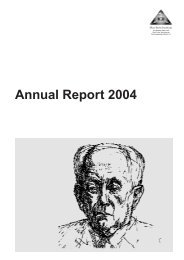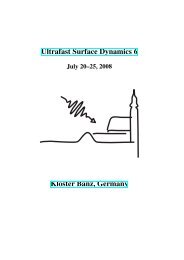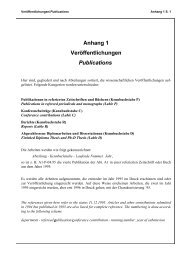You also want an ePaper? Increase the reach of your titles
YUMPU automatically turns print PDFs into web optimized ePapers that Google loves.
Fig. 37<br />
The original paper by Doll and<br />
Hill linking cigarette smoking<br />
and cancer.<br />
Fig. 38<br />
Confirmation over fifty years of<br />
the smoking-cancer link.<br />
Fig. 36<br />
Richard Doll, discoverer of cigarette<br />
smoking as a cause of<br />
lung cancer (Sir Richard died in<br />
July 2005).<br />
20<br />
<strong>Max</strong> <strong>Born</strong> • Gustav <strong>Born</strong><br />
of nature for centuries. <strong>Born</strong>’s statistical interpretation of Schrödinger’s wave function, an<br />
essential element of quantum mechanics, was causality’s death knell.”<br />
Schrödinger [34] found <strong>Born</strong>’s interpretation of the wave function so unsettling that at one<br />
point he wished that he had never written his original article. What fostered dissent was not<br />
the mathematical formalism but the physical interpretation. To Schrödinger the wave function<br />
was real; in <strong>Born</strong>’s new theory it was probabilistic. Einstein too felt unable to accept this new<br />
and fundamental indeterminism. In December 1926 he wrote to <strong>Max</strong>: “Quantum mechanics is<br />
certainly imposing but an inner voice tells me that it is not yet the real thing. The theory says<br />
a lot, but does not really bring us any closer to the secret of ‘the old one’. I, at any rate, am<br />
convinced that He is not playing at dice...” <strong>Max</strong> comments: “Einstein’s verdict on quantum<br />
mechanics came as a hard blow to me: he rejected it not for any definite reason, but rather by<br />
referring to an ‘inner voice’. This rejection... was based on a basic difference of philosophical<br />
attitude, which separated Einstein from the younger generation to which I felt that I belonged,<br />
although I was only a few years younger than Einstein”. When my father died at the age of<br />
eighty-seven I thought of him as still the youngest man I have ever known!<br />
<strong>Max</strong> went on to explain: “I am emphatically for the retention of the particle idea... I was witnessing<br />
the fertility of the particle concept every day in Franck’s brilliant experiments on atomic<br />
and molecular collisions [35], and was convinced that particles could not simply be abolished”<br />
(<strong>Born</strong>, 1968). And in the Nobel Lecture he asked: “Can we still call something with which<br />
the concept of position and motion cannot be associated in the usual way a thing, a particle?<br />
And if not, what is the reality that our theory has been invented to describe? The answer to












